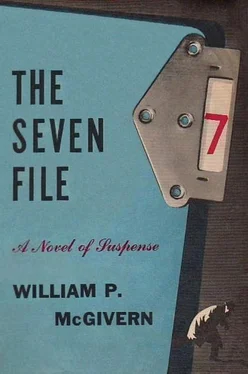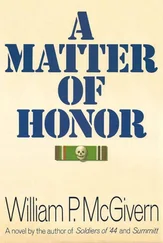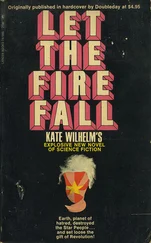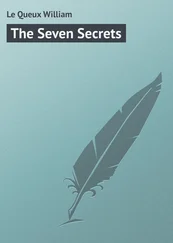William McGivern - The Seven File
Здесь есть возможность читать онлайн «William McGivern - The Seven File» весь текст электронной книги совершенно бесплатно (целиком полную версию без сокращений). В некоторых случаях можно слушать аудио, скачать через торрент в формате fb2 и присутствует краткое содержание. Город: New York, Год выпуска: 1956, Издательство: Dodd, Mead & Company, Жанр: Криминальный детектив, на английском языке. Описание произведения, (предисловие) а так же отзывы посетителей доступны на портале библиотеки ЛибКат.
- Название:The Seven File
- Автор:
- Издательство:Dodd, Mead & Company
- Жанр:
- Год:1956
- Город:New York
- ISBN:нет данных
- Рейтинг книги:4 / 5. Голосов: 1
-
Избранное:Добавить в избранное
- Отзывы:
-
Ваша оценка:
- 80
- 1
- 2
- 3
- 4
- 5
The Seven File: краткое содержание, описание и аннотация
Предлагаем к чтению аннотацию, описание, краткое содержание или предисловие (зависит от того, что написал сам автор книги «The Seven File»). Если вы не нашли необходимую информацию о книге — напишите в комментариях, мы постараемся отыскать её.
The Seven File — читать онлайн бесплатно полную книгу (весь текст) целиком
Ниже представлен текст книги, разбитый по страницам. Система сохранения места последней прочитанной страницы, позволяет с удобством читать онлайн бесплатно книгу «The Seven File», без необходимости каждый раз заново искать на чём Вы остановились. Поставьте закладку, и сможете в любой момент перейти на страницу, на которой закончили чтение.
Интервал:
Закладка:
Now Grant and Duke were in the living room together, and Hank could hear the murmur of their voices. They took no chance in leaving him alone; the back door was locked, the key was in Grant’s possession and the windows had been nailed shut. The only way in or out was through the front door and one of them was on guard in the living room all the time. Even with two good hands he wouldn’t have had a prayer.
Hank rubbed the tips of his fingers against his forehead. The phone had rung a few moments ago. and when he heard Grant talking, he had succumbed to an old, wistful hope; perhaps Duke would have a change of heart and turn against Grant. Maybe it would happen. He was a victim of hope for he had never stopped trying to understand Duke.
Even now he was trying to understand how his brother had gotten involved with Grant. The habit of apology was too strong to break; there must be powerful reasons for what Duke had done, he thought. If he could understand him, he could forgive him. That had always been his hope.
He couldn’t judge Duke coldly, dispassionately. Never... because he was responsible for what Duke had become. He couldn’t forget that. He could only try to understand him...
They had been raised in a small town in Wisconsin, a land of brilliant lakes and fresh-smelling pine trees, a land with a nostalgic frontier feeling to it; the Chippewa reservation was only a few miles away, and most of the boys in the area had learned their trapping and hunting and fishing directly from the Indian guides. And Duke had learned more than anyone else. Even the old Indians admitted there was little they could show him. At fifteen he could disappear into the woods and live there for weeks at a time, without matches or blankets or camping equipment. He took nothing but fishhooks, line and a coil of rope for trapping. And his knife, of course. Duke was never without that. He ignored fish and game laws — a doe was meat to him. nothing else. He peddled venison to the tourists, and sold whiskey to the Indians, a federal offense. But no one was particularly exercised by his wildness. He was tall and dark, beautifully built, and was well aware of the value of his smile. If he couldn’t bully people, he charmed them. If neither tactic worked he ignored them — or struck back when they weren’t expecting it. A few people in town were onto him, of course. Horchmyer, the druggist for one. Duke had tried to buy certain items from him, and since then the old man had watched him with a cold eye. And the Rawlings family. There had been quite a bit of talk about how Jimmy Rawlings’ shoulder was broken in football practice — the whistle had blown several seconds before Duke came down hard on little Jimmy. But nothing came of the talk. There were men who took Duke’s side. Nobody blames him when he bangs over for a touchdown, do they?
That was true enough. Lamson High won twenty-two straight games with Duke as fullback, and the University scouts were all down to watch him play.
But he wasn’t popular at school. Some girls liked him, but he had little interest in that type. He preferred conflict; his favorite targets were the innocents who had been raised in families with gentleness and dignity. They weren’t prepared for his kind of attacks; they were his choice victims.
What was wrong? Hank thought, rubbing his forehead. It seemed that he had spent a lifetime trying to understand Duke.
Maybe it was his mother. He and Duke were half-brothers. Duke’s father had married a second time when Duke was eight years old. Hank had been born a year later. Duke had been a difficult youngster and Hank had grown up in an atmosphere tense and uneasy with propitiation; his mother feared she was failing with Duke and went to distracted lengths to earn his affection. Duke played on her fears; he demanded bribes, not for good conduct but as a hostage against worse; if he got this, he would not do that. These were his terms to his stepmother.
The whole house had revolved around his moods and tempers. Even his own father was involved in this blackmail; he too wanted peace in the family at any price. He was an easy-going sort, a small-town store keeper, a man who would rather lose an issue than win it, if the winning was going to cause hard feelings. He was modest and retiring: “If anyone wants my opinion, which I know isn’t likely—” That was his father’s smiling preface to any argument or discussion. Tactful, obliging — weak. The way I’m weak, Hank thought.
His father simply couldn’t handle Duke. He smiled and talked of “boys’ hi-jinks” when complaints were brought to him. And he promised that he’d have a talk with his son. But he said and did nothing. He was afraid Duke might walk out if he attempted to discipline him, but at the same time he was proud of the boy’s looks, his arrogance, his superb physical talents. The big men in town had got in the habit of dropping by the store to chat before and after games, and this was a very pleasant thing; cigars were passed, backs were slapped and there was an illusion of warm, easy equality. It would be very hard to give all this up. They were things he had never known before. It was asking a lot of him (as one teacher had asked) to take Duke off the team until his marks improved. It made lying for him almost an instinctive reflex — as he lied twice, once to the police and again to Jo Reynold’s father: “The boy was in bed at ten-thirty. Yes, I looked in on him.” It was an easy thing to say.
It went this way until the accident. And that was the end of many things, the start of many things...
The living room fire was a soft red eye, watching Hank as he fell asleep on the sofa. He was nine then, the night of the accident, but he had remembered the look of the fire all his life — that soft red eye in the darkness was a part of his nightmares. Duke was asleep upstairs and his father was in town for the monthly dinner of one of his service clubs. Perhaps if his mother had been alive it would have been different. But she had died six months before.
A falling spark must have landed on the carpet. A newspaper had caught, and then the curtains...
Hank had awakened a few minutes later, screaming through the smoke for his brother. There was no way to get up to him; the flames were six feet high in front of the stairs. And Duke couldn’t get down. So he had jumped.
Hank was under his windows by then, shouting his name over and over, and he saw Duke kick through the pane, balance himself for an instant on the ledge and then leap out into the darkness. He was grinning as he landed, his teeth flashing in his face; the danger exhilarated him, the physical challenge fired his blood. He was supremely confident, contemptuous of the risk — but the drop was long and the earth was hard as iron. Duke’s right leg was broken at the knee. After three months in the hospital he was sent home on crutches. The improvement the doctor had cautiously predicted never materialized. Duke’s limp became as much a part of him as the color of his eyes...
Hank lifted his head. Grant and Duke had stopped talking, and in the silence he heard the nurse’s soft footsteps coming down the stairs. She opened the door and crossed the living room to the kitchen, walking with quick, precise strides. She was very tired, he saw; her face was pale and drawn, and there was a tiny pulse beating rapidly in her throat. And he saw something else in her expression...
He stood up and said, “What’s the matter?”
“I think Jill is sick. She’s running a fever.”
“Well—” He wet his lips, hating to put his helplessness into his words. What could he say? That it was too bad, j and he was sorry as hell? “Should she have a doctor?” he said.
“I’m not sure. Sometimes these flare-ups go down overnight.”
Читать дальшеИнтервал:
Закладка:
Похожие книги на «The Seven File»
Представляем Вашему вниманию похожие книги на «The Seven File» списком для выбора. Мы отобрали схожую по названию и смыслу литературу в надежде предоставить читателям больше вариантов отыскать новые, интересные, ещё непрочитанные произведения.
Обсуждение, отзывы о книге «The Seven File» и просто собственные мнения читателей. Оставьте ваши комментарии, напишите, что Вы думаете о произведении, его смысле или главных героях. Укажите что конкретно понравилось, а что нет, и почему Вы так считаете.











